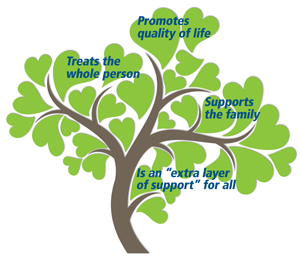
PALLIATIVE CARE
World Health Organization defines palliative care as “an approach that improves the quality of life of patients and their families facing the problem associated with life-threatening illness, through the prevention and relief of suffering by means of early identification and impeccable assessment and treatment of pain and other problems, physical, psychosocial and spiritual
What is Palliative Care
Palliative care (pronounced pal-lee-uh-tiv) is specialized medical care for people with serious illness. Its focus is on reducing the symptoms, pain, stress and side effects related to the illness so patients can live more comfortably. Palliative care does not replace primary treatment, it works together with the treatment, providing an extra layer of support for meeting physical, emotional, spiritual and practical needs.
A common misconception is that palliative care and hospice are the same. This is not true; palliative care is appropriate for any stage of disease, at any point in treatment and can be used even when the treatment is likely to cure the patient. Hospice focuses on person’s final months in life.
Who provides Palliative Care

Palliative care is for those who are seriously or chronically ill and is available any time during that illness. People can receive palliative care at the same time they receive treatment meant to cure an illness.
Palliative care team is an interdisciplinary specially trained team of doctors, nurses, social workers, priests and other specialists who work together with a patient’s doctors to provide an extra layer of support as well as help patients and families navigate difficult medical decisions and manage stress. Some teams may also include nutritionists, massage therapists or other complementary medicine practitioners. These practitioners work in conjunction with a patient’s oncology team or other medical professionals to provide an extra layer of support to patients and families.
Effective symptom management is necessary for many patients coping with serious illness, regardless of the diagnosis or stage of disease. The goal of palliative care is to improve quality of life for patients and their families.
Hospitals in developed countries have a palliative care program, either as a consultation service in the hospital or access to professionals in the outpatient area.
What can a palliative care team offer me that my oncology team cannot?
The palliative care team provides extra support. They may provide their expertise in symptom and pain management. They may spend time discussing treatment goals and helping a patient and their family sort through difficult decisions. They may provide emotional and spiritual support for patients and families. The team can often provide more time and support than is possible in a busy oncology clinic. However, they are a part of your larger team and keep in close communication with your oncology team.
When is palliative care appropriate?
Palliative care is appropriate for any stage of disease and any point in the treatment continuum. Unlike hospice, palliative care can go hand-in-hand with active, curative treatment. Palliative care is not limited to patients with a cancer diagnosis and can be used by any patient diagnosed with a serious illness r a life threatening disease.
Shipley Foundation Palliative Care Programme
We have a three stage programme. Our mission is to provide an extra layer of support during hospitalization of patients, their family and staff.
Stage 1: Rehabilitate and support children diagnosed HIV +
Stage 2: Rehabilitate and support marginalized women diagnosed HIV+
Stage 3: Rehabilitate and support marginalized men and women diagnosed HIV+
Our team strives to improves patients quality of life by reducing the stress caused by illness as well as helping to control pain and physical symptoms and emotional and spiritual challenges facing children and people with life long disease.
In the State of Maharastra, 10 lakh children need palliative care. http://dnai.in/adkt
Shipley Foundation Palliative Care Interventions
1. Engage with government, corporates and civil society to provide palliative care infrastructure (buildings) and allocate funds for basic equipment and human resources.
2. Capacity building of medical /nursing teaching institutions to integrate palliative care in medical teaching courses.
3. Capacity building of medical practitioners, nurses and hospital staff on palliative care through workshops an camps
4. Public advocacy to raise awareness in civil society and at the policy level on the importance of palliative care
5. Develop a common platform/ network/database of existing palliative centers in India.

